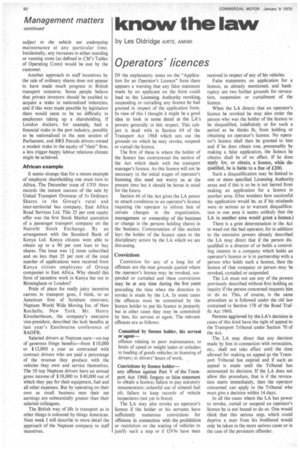know the law
Page 56

If you've noticed an error in this article please click here to report it so we can fix it.
by Les Oldridge AIRTE, AMIMI
Operators' licences
IN the explanatory notes on the "Application for an Operator's Licence" form there appears a warning that any false statement made by an applicant on the form could lead to the Licensing Authority revoking, suspending or curtailing any licence he had granted in respect of the application form. In view of this I thought it might be a good idea to look in some detail at the LA's powers generally in this respect. This subject is dealt with in Section 69 of the Transport Act 1968 which sets out the grounds on which he may revoke, suspend or curtail the licence.
The first of these is where the holder of the licence has contravened the section of the Act which deals with the transport manager's licence. As this licence will not be necessary in the initial stages of operator's licensing this need not worry us at the present time but it should be borne in mind for the future.
Section 66 of the Act gives the LA power to attach conditions to an operator's licence requiring the operator to inform him of certain changes in the organization, management or ownership of the business or change in the persons holding shares in the business. Contravention of this section lays the holder of the licence open to the disciplinary action by the LA which we are discussing.
Convictions
Conviction for any of a long list of offences are the next grounds quoted where the operator's licence may be revoked, suspended or curtailed and these convictions may be at any time during the five years preceding the time when the direction to revoke is made by the LA. In some cases the offences must be committed by the licence holder to put his licence in jeopardy but in other cases they may be committed by him, his servant or agent. The relevant offences are as follows: Committed by licence holder, his servant or agent—
offence relating to poor maintenance; to limits of speed or weight laden or unladen; to loading of goods vehicles; to licensing of drivers; to drivers' hours of work.
Convictions by licence holder— any offence against Part V of the Tramport Act 1968; forgery or false statement to obtain a licence; failure to pay statutory remuneration; unlawful use of rebated fuel oil; failure to keep records of vehicle inspections (not yet in force).
The LA may also revoke an operator's licence if the holder or his servants have sufficiently numerous convictions for offences in connection with the prohibition or restriction on the waiting of vehicles to justify such a step or if GV9s have been received in respect of any of his vehicles.
False statements on application for a licence, as ,already mentioned, and bankruptcy are two further grounds for revocation, suspension or curtailment of the licence.
When the LA directs that an operator's licence be revoked he may also order the person who was the holder of the licence to be disqualified, indefinitely or for such a period as he thinks fit, from holding or obtaining an operator's licence. No opera tor's licence shall then be granted to him and if he does obtain one, presumably by making a false application, the licence he obtains shall be of no effect. If he does apply for, or obtain, a licence, while disqualified, he is liable to a fine of £200.
Such a disqualification may be limited to one or more specified Licensing Authority areas and if this is so he is not barred from making an application for a licence in another area. (One wonders how successful his application would be, as if his misdeeds were so serious as to warrant disqualification in one area it seems unlikely that the LA in another area would grant a licence.) There is a grim determination in the Act to weed out the bad operator, for in addition to the extensive powers already described the LA may direct that if the person disqualified is a director of or holds a control ling interest in a company which holds an operator's licence or is in partnership with a person who holds such a licence, then the licence of that company or person may be revoked, curtailed or suspended.
The LA must not use any of the powers previously described without first holding an inquiry if the person concerned requests him to do so. This, of course, is the same procedure as is followed under the old law contained in Section 178 of the Road Traffic Act 1960, Persons aggrieved by the LA's decision in cases of this kind have the right of appeal to the Transport Tribunal under Section 70 of the Act.
The LA may direct that any decision made by him in connection with revocation, etc., shall not take effect until the time allowed for making an appealW the Transport Tribunal has expired and if such an appeal is made until the Tribunal has announced its decision. If the LA does not allow this procedure, that is if the revoca tion starts immediately, then the operator concerned can apply to the Tribunal who must give a decision within 14 days.
In all the cases where the LA has power to revoke, curtail or suspend an operator's licence he is not bound to do so. One would think that this serious step, which could deprive a man from his livelihood would only be taken in the more serious cases or in the case of the persistent offender.








































































































